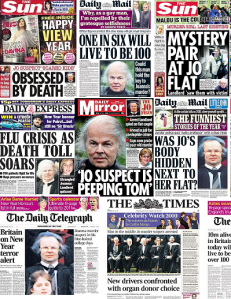 The UK press may show more restraint in reporting of high-profile cases if contempt laws are vigorously enforced, says Brian Cathcart
The UK press may show more restraint in reporting of high-profile cases if contempt laws are vigorously enforced, says Brian Cathcart
The next time there is a sensational murder — something on the scale of the Ipswich or Soham cases — you may notice something different about the media coverage. Reporters may show restraint of a kind that is not familiar. In fact, they might actually obey the law.
The Contempt of Court Act of 1981 prohibits all but the most straightforward reporting in a crime case from the moment “proceedings are active”, in other words once someone is arrested. The idea is to ensure that coverage does not interfere with the course of justice, for instance by prejudicing the eventual jury. But for years, when a big, competitive story came along, many editors and reporters in national media simply ignored the Act and continued to publish often grotesque allegations about a suspect after arrest and even sometimes after they were charged. Think Colin Stagg, Barry George, Karen Matthews and others — and Stagg and George were later shown to be innocent.
That may be about to change thanks to the actions of the attorney-general, Dominic Grieve. Not normally a man to cut the figure of a hero — a lean, bookish type, he was last seen filibustering awkwardly in the Commons when the government was under pressure over its links with the Murdochs — Grieve has done something genuinely brave. He has prosecuted the Daily Mirror and the Sun for contempt of court in the Chris Jefferies case, and he has won.
The consequences could be significant. Not only might future reporting of crime be more restrained, but we could even see fewer miscarriages of justice. I reported the first trial of Barry George for the murder of Jill Dando in 2002 and I am convinced that his wrongful conviction was partly due to the influence on the jury of the grossly prejudicial press reporting about him after his arrest. George spent seven years in jail before the conviction was overturned.
 Chris Jefferies, you may remember, is the retired teacher in Bristol who was monstered by the tabloids before and after his arrest in January in connection with the Joanna Yeates murder, and who turned out to be totally innocent. (Another man confessed to the killing.) On the morning of 28 July, in what is becoming a familiar ritual in our courts, eight newspapers serially confessed to libelling Jefferies and agreed to pay him substantial damages.
Chris Jefferies, you may remember, is the retired teacher in Bristol who was monstered by the tabloids before and after his arrest in January in connection with the Joanna Yeates murder, and who turned out to be totally innocent. (Another man confessed to the killing.) On the morning of 28 July, in what is becoming a familiar ritual in our courts, eight newspapers serially confessed to libelling Jefferies and agreed to pay him substantial damages.
On the afternoon of the same day, however, something much less familiar happened: the Lord Chief Justice, Lord Judge, and two other judges found the Mirror and the Sun guilty of contempt of court. They upheld Grieve’s argument that, by publishing “exceptionally adverse and hostile” articles about Jefferies while he was in custody, the papers had breached section 2 (2) of the Act, which makes unlawful any publication about an individual who is under arrest “which creates a substantial risk that the course of justice in the proceedings in question will be seriously impeded or prejudiced”.
In a way, what is surprising here is not that a contempt prosecution happened and succeeded, but that it was necessary at all. The law is reasonably clear, after all, and is very well known to journalists. The problem has been that Grieve’s predecessors, most recently Baroness Scotland and Lord Goldsmith, failed to show the press that they would uphold it. The rarity of prosecutions, despite apparently flagrant breaches in high-profile cases, led editors to behave as though the Act was a dead letter and they could do what they liked.
Grieve therefore deserves credit for taking on the tabloids where his predecessors would not, and it is worth noting that he did so before the revelation that Milly Dowler’s phone had been hacked, and thus before these papers lost a lot of their bullying power. He didn’t kick them when they were down, in other words; he kicked them when they were still up.
Grieve has to share the credit, however, with the judges, who were placed in a tight corner by this case and who found an ingenious way out. For as long as the press has flouted the contempt law, judges have been finding excuses to try the victims anyway. When a trial begins and the defence claims it can’t be fair because their client has already been brutally convicted in the press, judges have developed a list of arguments to justifying carrying on regardless. Here is what they say. Jury members don’t remember the adverse reporting by the time the trial comes around (the “fade factor”), they know to concentrate on what is said in court (the “focus factor”) and they heed the instructions of judges to ignore extraneous matters. These arguments are entirely unsupported by evidence but they have had the merit, from the judges’ point of view, that important trials don’t have to be abandoned because of the excesses of the tabloids.
However, in the brief trial of the Sun and the Mirror, the judges found these arguments turned back on them. In effect the papers said: “If, when trials begin, you judges always insist that hostile reporting at the time of arrest doesn’t make a difference, then you can’t turn around now and say the opposite. It follows that whatever we wrote about Chris Jefferies at the time of his arrest, no matter how hostile, can’t now be described as prejudicial or even potentially prejudicial.”
It was a tricky problem for the judges and they simply side-stepped it, finding the Mirror and the Sun guilty on other, rather creative grounds. The Act speaks of publication “which creates a substantial risk that the course of justice in the proceedings in question will be seriously impeded or prejudiced”. The judges avoided saying that in the Jefferies case potential proceedings might have been prejudiced; instead they concluded that they could have been impeded.
What this means is that they decided Jefferies had been painted in such an appalling light by these papers that if he had been charged he would have found it more difficult to construct a defence. Witnesses in his support, for example, might have decided not to come forward, either because they feared association with this supposedly monstrous person or because they believed his conviction was a foregone conclusion.
Both papers were undoubtedly surprised by this ingenious judgement — and the attorney-general probably was too. The point about “impedence” had not been prominent in the case he put forward in court — it was fourth on a list of five arguments and was presented rather tersely. Indeed he felt the need to reassure the judges it was not just a “makeweight” in his case.
The Mirror was fined £50,000 for contempt and the Sun £18,000. They were refused permission to appeal, though according to Jefferies’s solicitor, Louis Charalambous, they are considering petitioning the Supreme Court. On the whole it seems unlikely that a considered finding by the Lord Chief Justice and two other judges will be overturned.
Where does this leave us? Contempt law is back on the editors’ radar at a time when, with Lord Leveson’s inquiry beginning its investigation of press standards, those editors must already be minding their Ps and Qs. It might be argued that the fines were small — papers pay much more in libel damages and generally go on to libel again — but Grieve has put down an important marker and is free to use the impedance argument again if he wishes. If papers don’t heed this warning, moreover, he has it in his power to crank things up, notably by citing not only the newspaper but also the editor in person in a future case. That might concentrate minds.
We will have to wait and see, but there is a strong chance that in future sensational criminal cases we will see a return to what used to happen, generally, 20 years ago and more. So long as no one is in custody, papers will remain free to report what they choose (consistent with the libel laws), but from the moment proceedings are active, in other words normally from the moment someone is arrested, they must show restraint. And the same law applies to online reporting, bloggers and tweeters.
It is, without doubt, a constraint on free expression, and an important one. But it is surely better than locking up innocent people because, in effect, journalists don’t like the look of them.
Brian Cathcart teaches journalism at Kingston University London and is a founder of Hacked Off. He tweets at @BrianCathcart




